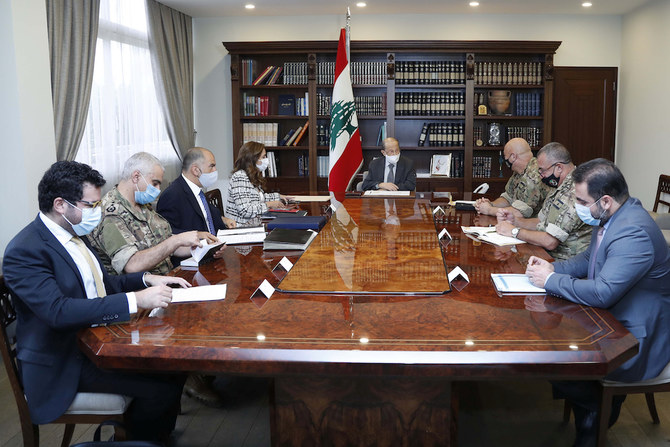BEIRUT: After decades of conflict, Lebanon and Israel are set for the first round of talks over their maritime border that runs through potentially oil- and gas-rich Mediterranean waters.
The US-mediated meeting between officials from both sides will be held at the headquarters of the UN Interim Force in Lebanon (UNIFIL) on Wednesday. This will be followed by talks on demarcating the land border.
David Schenker, US undersecretary of state for Near Eastern affairs, will preside over the inaugural session of the maritime talks, according to the State Department. Beirut insists that these talks “have nothing to do with normalization” of ties with Israel.
On the eve of the meeting, Lebanese President Michel Aoun reviewed preparations for it and met with Jan Kubis, UN special coordinator for Lebanon.
“The UN welcomes hosting the negotiations session,” Kubis said. “The international organization will do its duty by hosting and sponsoring the negotiations, and provide all necessary facilities to make it successful.”
Aoun met with the Lebanese negotiating delegation, and expressed hope “to reach a just solution that protects the sovereign rights of the Lebanese people.”
According to Aoun’s media office, he said: “The negotiations are technical and limited to demarcating the maritime borders … The US party is present in the negotiations as a mediator to facilitate the process.”
He instructed the delegation “to stick to and defend Lebanese rights recognized internationally.”
Lebanon is putting high hopes on a positive outcome, which could foster a secure environment for international companies to explore oil and gas fields off the country’s coast.
The contested zone between Lebanon and Israel in the Mediterranean is estimated at 860 sq. km and is known as Block 9, which is rich in oil and gas.
“What’s expected on Wednesday during the negotiations is that each party will come up with a paper that includes all subjects that will be put on the table, and the US side might come up with a paper that includes some solutions,” Dr. Riad Tabbarah, former Lebanese ambassador to Washington, told Arab News.
“Usually an agenda is set with a primary point that negotiations would revolve around, then points that might lead to an agreement would be picked up to build on them to reach a final agreement over all other points,” he said.
“Each party will try whatever it can to get the maximum that it could in the negotiations. These talks might also be stalled so that each party would refer to its government.”
But the absence of a government in Lebanon begs the question: To whom will the country’s delegation refer?
Former Minister Rachid Derbas told Arab News: “In this case and according to the constitution, it will be the president of the republic, but in case of the need to take a decision, this necessitates the availability of an active government and not a caretaker government, as is the case today.”
Former Prime Minister Fouad Siniora criticized Aoun “for breaching the constitution while forming the negotiating delegation with Israel,” because “according to the constitution and to the norms, the president should have consulted with the prime minister prior to the formation of the delegation.”




























